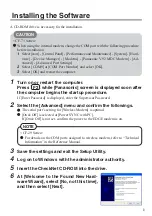
User’s Manual
G-3
Bluetooth wireless technology Interoperability
Bluetooth wireless technology and your Health
The products with Bluetooth wireless technology, like other radio devices,
emit radio frequency electromagnetic energy. The level of energy emitted
by devices with Bluetooth wireless technology however is far much less
than the electromagnetic energy emitted by wireless devices like for
example mobile phones.
Because products with Bluetooth wireless technology operate within the
guidelines found in radio frequency safety standards and
recommendations, TOSHIBA believes Bluetooth wireless technology is
safe for use by consumers. These standards and recommendations reflect
the consensus of the scientific community and result from deliberations of
panels and committees of scientists who continually review and interpret
the extensive research literature.
In some situations or environments, the use of Bluetooth wireless
technology may be restricted by the proprietor of the building or responsible
representatives of the organization. These situations may for example
include:
■
Using the equipment with Bluetooth wireless technology on board of
airplanes, or
■
In any other environment where the risk of interference to other devices
or services is perceived or identified as harmful.
If you are uncertain of the policy that applies on the use of wireless devices
in a specific organization or environment (e.g. airports), you are
encouraged to ask for authorization to use the device with Bluetooth
wireless technology prior to turning on the equipment.
Regulatory statements
General
This product complies with any mandatory product specification in any
country/region where the product is sold. In addition, the product complies
with the following.
European Union (EU) and EFTA
This equipment complies with the R&TTE directive 1999/5/EC and has
been provided with the CE mark accordingly.
Canada - Industry Canada (IC)
This device complies with RSS 210 of Industry Canada.
Operation is subject to the following two conditions: (1) this device may not
cause interference, and (2) this device must accept any interference,
including interference that may cause undesired operation of this device.
















































